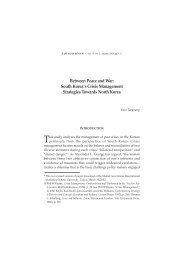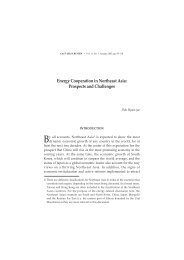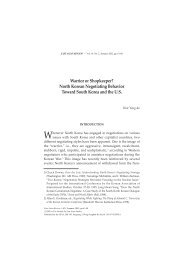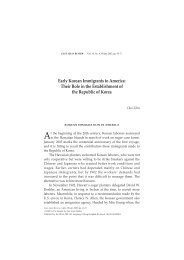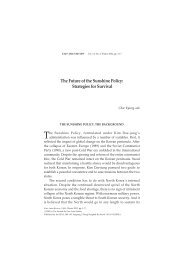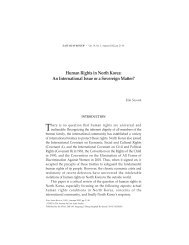Sino-Korean Relations since 1992 - the Institute for East Asian Studies
Sino-Korean Relations since 1992 - the Institute for East Asian Studies
Sino-Korean Relations since 1992 - the Institute for East Asian Studies
You also want an ePaper? Increase the reach of your titles
YUMPU automatically turns print PDFs into web optimized ePapers that Google loves.
16 EAST ASIAN REVIEW SPRING 2002<br />
maintain its regime based on recognition of “a divided Korea” as a<br />
reality. However, <strong>the</strong> policy shift did not begin with <strong>the</strong> summit, but<br />
should be seen as <strong>the</strong> result of a long process that began when North<br />
Korea recognized that it would have a serious problem defending its<br />
system following <strong>the</strong> collapse of <strong>the</strong> Soviet Union and <strong>the</strong> <strong>East</strong>ern<br />
Communist bloc.<br />
That North Korea acknowledges a divided Korea as a reality also<br />
signifies its recognition of South Korea as a real entity. The changed<br />
North <strong>Korean</strong> attitude bears significance in terms of<br />
institutionalizing and establishing peace and coexistence between<br />
<strong>the</strong> two Koreas. Once North Korea begins to recognize South Korea<br />
as an actual political entity, <strong>the</strong> policy of peaceful coexistence, based<br />
<strong>the</strong> policy of “two Koreas” promoted by <strong>the</strong> neighboring four powers<br />
and South Korea, will bear visible results.<br />
The key to inspiring North Korea’s attitude toward change and<br />
its enthusiasm <strong>for</strong> resolving <strong>the</strong> <strong>Korean</strong> peninsula question lies in<br />
changing <strong>the</strong> North <strong>Korean</strong> system. Hence, ef<strong>for</strong>ts should be focused<br />
on creating conditions conducive to re<strong>for</strong>m and opening. Kim Jung-<br />
Il’s two visits to China is ample evidence of a potential shift in North<br />
Korea’s policy line.<br />
In 1987, when China defined itself as “socialism in <strong>the</strong> early<br />
stage” in order to promote re<strong>for</strong>m, North Korea altered its attitude<br />
on China. Fur<strong>the</strong>rmore, when South Korea and China established<br />
diplomatic ties, North Korea maintained opposition toward China<br />
more strongly. North Korea’s antagonism to China’s re<strong>for</strong>m policy<br />
changed, however, with Kim Jung-Il’s visit to Beijing. The fact that<br />
Kim Jung-Il offered a positive assessment of China’s re<strong>for</strong>m policy to<br />
<strong>the</strong> Chinese leaders during his visit to Beijing, illustrates <strong>the</strong> change<br />
in North Korea’s attitude. While Kim Jung-Il’s assessment of China’s<br />
re<strong>for</strong>m policies were brief and non-committal at that time, his<br />
comments after <strong>the</strong> January visit to Pudong, Shanghai were more<br />
sweeping, signifying a new step <strong>for</strong>ward.<br />
Since 2001, North Korea has stressed a new ideological<br />
perspective, and this can be assessed as a break from <strong>the</strong> existing



